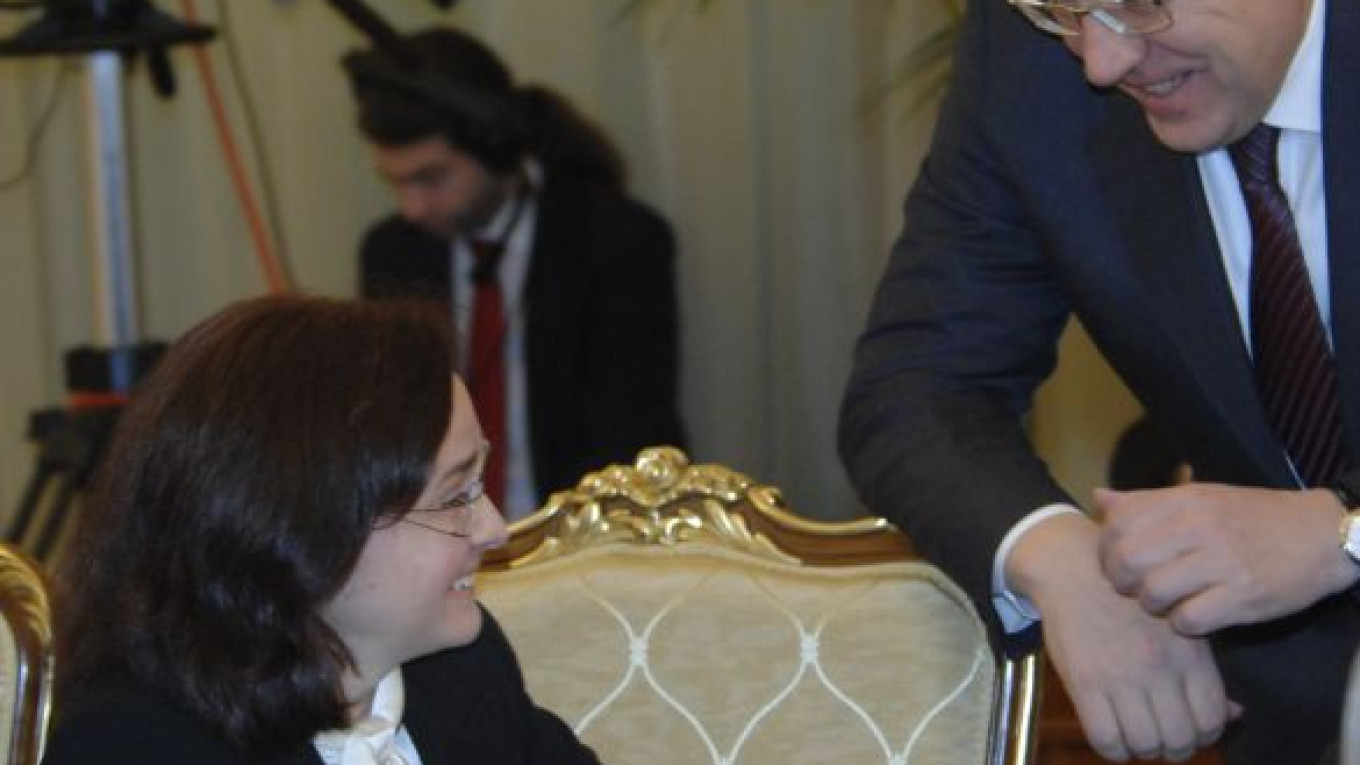The government has done well in prioritizing spending during the crisis, but severe budget cuts and systemic reforms will be required over the next three years, Prime Minister Vladimir Putin said Friday.
“We need to do a complete revision of our current obligations and cut ineffective and secondary spending,” Putin said in an unusually long and decisive address to the Finance and Economic Development ministries.
Despite calls by deficit hawks such as Finance Minister Alexei Kudrin to lower social spending as government revenues plunged in 2009, the government maintained its levels of welfare spending by dipping deep into the Reserve Fund, where the government had saved some of its windfall oil revenues over the past decade.
Putin said the high level of spending during the crisis helped Russia avoid protests like those currently rocking Greece, and social and political instability that "limits the opportunities for healthy macroeconomic and general economic policies."
Last month, Kudrin said government spending would have to come down by as much as 20 percent by 2015.
Next year, the budget deficit is projected at 4 percent if the price of oil is $70 a barrel, but if oil falls to $50 a barrel, the deficit will be 8 percent, "a risky number," Kudrin said at the meeting Friday.
The 2010 budget will be balanced only if oil averages $95 a barrel, "taking into account that we are also spending the Reserve Fund," Kudrin said. He predicted that the budget deficit would be 5.2 percent to 5.4 percent this year.
Economic Development Minister Elvira Nabiullina said at the meeting that the ministry was predicting $76 oil through 2011, but Kudrin warned against such optimistic forecasts, saying that in 2009, the Finance Ministry “seriously overvalued its expectations for the price of oil,” balancing the budget with oil at $95 a barrel when the real price was only $61.
To boost budget earnings, the government will consider decreasing tax deductions at a Wednesday meeting where the Cabinet will discuss Russia’s tax policies for the next three years, Kudrin said. ?
"For Russia, the norm is a low, even zero budget deficit. Therefore, it is important to meet the goal of lowering the deficit to 3 percent in 2012 and to zero in 2015," Putin said.
The government depends on revenues from the oil and gas sector for more than 40 percent of its budget.
In order to kick the economy's dependence on resource extraction, Russia must build a modern economy by eliminating noncompetitive companies, encouraging innovation and preparing state companies for their eventual privatization, Putin said. The government also must tighten control over financial markets and modernize customs policies, he said.
“We need solutions that push state companies to use modern management models. And salaries for their management must be tied to the figures for lowering expenses, raising energy and labor efficiency and introducing new technologies,” Putin said.
The prime minister also called for stronger efforts to suppress inflation, which "should be kept at a low level not only by limited demand but … by consistent government policies" such as raising labor productivity, cost-cutting and effective anti-monopoly regulation.
Nabiullina said Russia must improve its “unsatisfactory” investment climate and change the focus of its exports from the struggling European markets to the more dynamic developing ones.
Russia's gross domestic product grew by 2.9 percent year on year in the first quarter of 2010, the State Statistics Service said Friday. ?
By the end of the year, GDP growth will be at least 5 percent, Central Bank First Deputy Chairman Alexei Ulyukayev said, adding that he “will be very surprised if the budget deficit will be over 5 percent [of GDP].”
He also predicted that inflation would be near 5 percent by year-end. “In the short term, the situation is not bad,” Ulyukayev said.
A Message from The Moscow Times:
Dear readers,
We are facing unprecedented challenges. Russia's Prosecutor General's Office has designated The Moscow Times as an "undesirable" organization, criminalizing our work and putting our staff at risk of prosecution. This follows our earlier unjust labeling as a "foreign agent."
These actions are direct attempts to silence independent journalism in Russia. The authorities claim our work "discredits the decisions of the Russian leadership." We see things differently: we strive to provide accurate, unbiased reporting on Russia.
We, the journalists of The Moscow Times, refuse to be silenced. But to continue our work, we need your help.
Your support, no matter how small, makes a world of difference. If you can, please support us monthly starting from just $2. It's quick to set up, and every contribution makes a significant impact.
By supporting The Moscow Times, you're defending open, independent journalism in the face of repression. Thank you for standing with us.
Remind me later.


